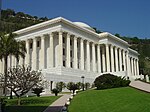Portal:Religion/Selected article/4
The Persia. Baháʼís number around 6 million in more than 200 countries around the world.
According to Baháʼí teachings, religious history is seen as an evolving educational process for mankind, through God's messengers, which are termed
Manifestations of God. Baháʼu'lláh is seen as the most recent, pivotal, but not final of these individuals. He claimed to be the expected redeemer and teacher prophesied in Christianity, Islam, Hinduism, Buddhism, and other religions
, and that his mission was to establish a firm basis for unity throughout the world, and inaugurate an age of peace and justice, which Bahá'ís expect will inevitably arise.
"Baháʼí" (/baˈhaːʔiː/) can be an adjective referring to the Baháʼí Faith, or the term for a follower of Baháʼu'lláh (Baháʼí is not a noun meaning the religion as a whole). The term comes from the Arabic word Baháʼ (بهاء), meaning "glory" or "splendor".

